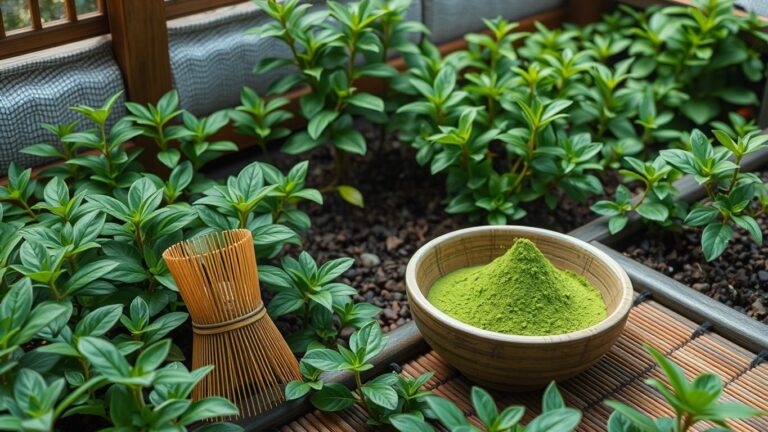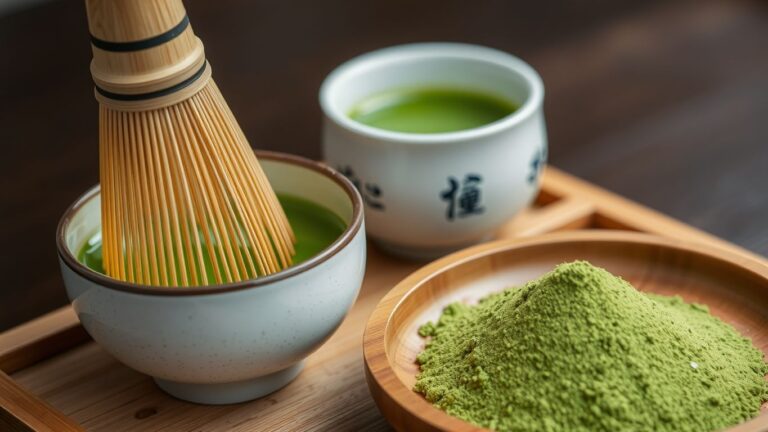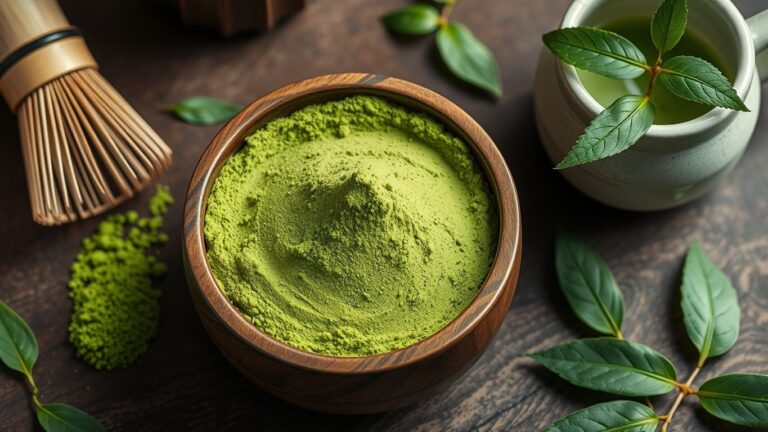Matcha, a finely ground green tea powder, has gained popularity for its numerous health benefits and unique flavor. However, many people are concerned about its potential to stain teeth. This article explores the science behind teeth staining, the unique properties of matcha, and offers practical tips to prevent and manage any discoloration.
Key Takeaways
- Matcha contains tannins and chlorophyll, which can stain teeth over time, especially if consumed frequently.
- The condition of your enamel plays a significant role in how much matcha can stain your teeth.
- Maintaining good oral hygiene, such as brushing and flossing, can help minimize the risk of staining from matcha.
- Using a straw and rinsing your mouth with water after drinking matcha can reduce its contact with your teeth and help prevent stains.
- Regular dental check-ups and professional cleanings are essential for keeping your teeth healthy and stain-free.
Understanding the Science Behind Teeth Staining
How Teeth Become Stained
Teeth staining happens when colored molecules from foods, drinks, or other substances get into the porous surface of your enamel. This process, called chromogenic accumulation, leads to discoloration over time. For example, if you often drink matcha, its fine particles and rich pigments can cause stains. An intrinsic tooth stain occurs when stain-causing particles work through the exterior of the tooth and settle below the surface.
Role of Enamel in Staining
Your enamel is the outermost layer of your teeth and plays a big role in how your smile looks. It’s a highly mineralized but porous structure that acts as the first line of defense against physical and chemical attacks, including staining from drinks like matcha. The health and thickness of your enamel can influence how easily your teeth get stained.
Impact of Dietary Choices on Teeth Color
What you eat and drink can greatly affect the color of your teeth. Foods and beverages with strong pigments, like matcha tea, can stain your teeth over time. Personal habits like smoking or not brushing your teeth well can make staining worse. Even some medicines and getting older can make your teeth less bright.
What Makes Matcha Unique?
Origins of Matcha
Matcha is a special type of green tea that comes from the Camellia sinensis plant, just like regular green tea. However, matcha is grown differently. The plants are shaded for most of their growth period, which increases chlorophyll production, boosts amino acid content, and gives the plant a darker green hue. After harvesting, the stems and veins are removed, and the leaves are ground into a fine powder known as matcha. This process ensures that matcha retains nutrients from the entire leaf, offering a more concentrated source of caffeine and antioxidants compared to regular green tea.
Nutritional Profile of Matcha
Matcha is packed with various bioactive compounds, including:
- Catechins: These are potent antioxidants, particularly epigallocatechin gallate (EGCG), which is known for its potential health benefits, such as reducing the risk of chronic diseases.
- Chlorophyll: This gives matcha its vibrant green color and is associated with detoxification and antioxidant properties.
- Tannins: These contribute to the astringency and bitterness in tea and are known to interact with proteins and other compounds.
- Fluoride: Matcha naturally contains fluoride, which is beneficial for dental health as it helps prevent tooth decay.
Health Benefits Beyond Oral Health
Matcha isn’t just a tasty beverage; it’s a health elixir! It’s rich in catechins, a type of antioxidant known to combat cell damage and fend off chronic diseases. Here are some of the health benefits of matcha:
- Antioxidant Powerhouse: Matcha’s preparation process ensures it retains a vast majority of the antioxidants, helping to stabilize harmful free radicals in the body.
- Liver Protection: Studies suggest that matcha can safeguard your liver, reducing the risk of liver disease.
- Brain Boost: Matcha has been shown to enhance brain function, improving attention, reaction time, and memory. It’s also rich in L-theanine, an amino acid that works synergistically with caffeine to boost brain function without the jitters associated with coffee.
- Heart Health: Regular consumption of matcha has been linked with a lower risk of heart disease, thanks to its ability to reduce bad cholesterol and regulate blood pressure.
- Weight Loss: Matcha can rev up your metabolism, helping in the fat-burning process, which is essential for weight loss.
Matcha not only has an insta-worthy hue, but this healthy beverage provides a sustained energetic boost, a unique flavor profile, a plethora of culinary options, and numerous health benefits.
Does Matcha Stain Teeth?
The Role of Tannins and Chlorophyll
Matcha contains tannins and chlorophyll, which can contribute to teeth staining. Tannins are compounds that can cause discoloration by sticking to the enamel. Chlorophyll, while giving matcha its vibrant green color, can also leave a greenish tinge on your teeth. However, the extent of staining depends on various factors, including your oral hygiene and enamel health.
Comparing Matcha to Other Beverages
Unlike coffee and black tea, matcha is less likely to stain your teeth because it contains lower levels of tannins. This makes matcha a better option if you’re concerned about teeth discoloration. A study in the Journal of Dental Sciences found that matcha caused less staining of hydroxyapatite ceramic than black tea, indicating it might be less likely to stain teeth compared to other beverages like coffee and even other types of tea.
Scientific Studies on Matcha and Teeth Staining
Scientific research suggests that matcha may be less likely to cause staining than other popular beverages. For instance, a study found that matcha caused less staining on dental materials compared to black tea. This is good news for matcha lovers who want to maintain a bright smile while enjoying their favorite drink.
Factors Influencing Matcha’s Staining Potential

Enamel Health and Thickness
The health and thickness of your enamel play a significant role in how much matcha can stain your teeth. Enamel acts as a protective barrier for your teeth, but if it’s thin or damaged, stains can penetrate more easily. Keeping your enamel strong through good oral hygiene and a balanced diet can help reduce staining.
Frequency and Quantity of Consumption
How often and how much matcha you drink also affects its staining potential. Drinking matcha frequently or in large quantities increases the chances of discoloration. Moderation is key to enjoying matcha without worrying too much about stains.
Preparation Methods
The way you prepare matcha can influence its staining potential. Traditional matcha tea is less likely to stain compared to matcha lattes or smoothies with added sweeteners and acidic ingredients. These additives can contribute to tooth discoloration more than matcha alone.
Here, we report that matcha, a product of Camellia sinensis, hampers the adherence and survival of P. gingivalis through multiple tactics. Matcha extract (ME) …
Expert Tips to Prevent Matcha-Induced Discoloration
If you’re a matcha enthusiast concerned about teeth staining, there are several strategies you can employ to minimize the risk. Here are some effective ways to prevent matcha-induced teeth stains:
Comparing Matcha and Coffee: Which Stains More?

When it comes to teeth staining, both matcha and coffee have their own unique properties. Understanding these differences can help you make informed choices about your beverage consumption and oral health.
Pigment Composition in Matcha and Coffee
Coffee is known for its dark, rich pigments that can easily stick to and penetrate the porous surface of your dental enamel. This leads to noticeable staining. On the other hand, matcha contains chlorophyll and tannins, which also have staining capabilities. However, the staining mechanism of matcha is different due to its fine particulate nature.
Staining Potential of Coffee
Coffee is generally more likely to cause stains compared to matcha. Several factors contribute to this difference:
- Color: Coffee is a dark beverage with a deep brown or black color, making it more likely to leave visible stains on your teeth.
- Acidity: Coffee is acidic, and the acid can soften tooth enamel over time, making it more susceptible to staining from other substances.
- Tannins: Both coffee and matcha contain tannins, but coffee tends to have higher tannin levels, increasing its staining potential.
- Preparation: The way coffee is prepared and consumed can also affect its staining potential. For example, espresso, a concentrated form of coffee, may have a stronger staining effect than a diluted cup of brewed coffee.
Scientific Comparisons
Research suggests that matcha may be less likely to cause staining than coffee. A study in the Journal of Dental Sciences found that matcha caused less staining of hydroxyapatite ceramic than black tea, indicating it might be less likely to stain teeth compared to other beverages like coffee and even other types of tea.
While coffee might present a more immediate staining threat due to its darker pigments, the unique properties of matcha, such as its finer particles, mean it cannot be discounted in discussions about teeth discoloration.
Ultimately, both beverages possess the potential to affect the aesthetic of your smile, so mindful consumption and diligent oral care are essential.
How to Remove Matcha Stains from Teeth
Even though matcha is a healthier option compared to many other drinks, it can still leave stains on your teeth over time. But don’t worry, there are effective ways to tackle these stains and keep your smile bright.
Effective Home Remedies
- Baking Soda Paste: Mix baking soda with a little water to form a paste. Brush your teeth with this paste once a week to help remove surface stains.
- Hydrogen Peroxide Rinse: Rinse with 3% hydrogen peroxide to remove stains. Peroxide is an antibacterial agent that can clean the entire mouth and gums.
- Oil Pulling: Swish coconut oil in your mouth for about 15-20 minutes. This ancient practice can help reduce stains and improve overall oral health.
Professional Dental Treatments
- Teeth Whitening Kits: Over-the-counter teeth whitening kits can be effective. Look for ones with good reviews and follow the instructions carefully.
- In-Office Whitening: Visit your dentist for professional whitening treatments. These are more potent and can provide quicker results.
- Dental Cleanings: Regular dental cleanings can help remove surface stains and keep your teeth healthy.
Preventive Measures
- Good Oral Hygiene: Brush and floss daily to remove plaque and food particles that can cause stains.
- Rinse After Drinking Matcha: After enjoying your matcha, rinse your mouth with water to wash away any lingering tannins and chlorophyll.
- Use a Straw: Drinking matcha through a straw can minimize contact with your teeth, reducing the risk of stains.
Remember, maintaining a bright smile while enjoying your favorite matcha is possible with these simple steps. Regular care and a few preventive measures can go a long way in keeping your teeth stain-free.
The Benefits of Matcha for Oral Health

Antibacterial Properties of Catechins
Matcha is rich in catechins, which have antibacterial properties. These compounds can help reduce harmful bacteria in your mouth, preventing tooth decay and gum disease. By inhibiting the growth of bacteria, matcha can also help reduce bad breath.
Fluoride Content in Matcha
Matcha contains fluoride, a mineral known for strengthening tooth enamel and preventing tooth decay. Regular consumption of matcha can contribute to better oral health by providing a natural source of fluoride.
Overall Impact on Oral Hygiene
Drinking matcha can have a positive effect on your overall oral hygiene. The antibacterial and anti-inflammatory properties of matcha help maintain a healthy mouth environment. Additionally, the antioxidants in matcha protect against oxidative stress, which can damage cells and tissues in your mouth.
Despite the potential for teeth staining, matcha offers several oral health benefits that should not be overlooked. By incorporating matcha into your diet and maintaining good oral hygiene, you can enjoy its benefits while keeping your smile bright.
Regular Dental Check-Ups: A Key to Preventing Stains

Regular dental check-ups are essential for keeping your teeth bright and healthy. By visiting your dentist regularly, you can catch potential issues early and keep your smile looking its best.
Importance of Professional Cleanings
At your regular checkup, a dental hygienist performs a thorough cleaning to remove plaque and tartar deposits. This process is called scaling. Afterwards, your teeth are polished to remove surface stains and make them shine. Regular cleanings can help maintain the natural color of your teeth and prevent long-term discoloration.
Frequency of Dental Visits
Most dentists recommend visiting the dentist every six months. However, if you consume a lot of staining foods or drinks, you might need to go more often. Regular visits ensure that any stains are addressed before they become permanent.
What to Expect During a Check-Up
During a dental check-up, your dentist will examine your teeth and gums for any signs of problems. They might take X-rays to get a better look at your teeth. After the examination, the dental hygienist will clean your teeth, removing any plaque and tartar. This helps to prevent cavities and gum disease, keeping your mouth healthy.
Remember, maintaining good dental hygiene practices is crucial to keeping your teeth healthy and bright while enjoying matcha or any other beverages.
Lifestyle Changes to Minimize Teeth Staining
Moderation in Consumption
Enjoying matcha in moderation can help reduce the risk of teeth staining. Excessive consumption of any beverage, even one as beneficial as matcha, can have negative effects on your dental health. Try to limit your intake to a reasonable amount each day.
Balanced Diet for Oral Health
A balanced diet plays a crucial role in maintaining your oral health. Foods rich in calcium, like dairy products, can help strengthen your enamel. Additionally, crunchy fruits and vegetables can help clean your teeth naturally. Avoiding sugary and acidic foods can also prevent enamel erosion and staining.
Avoiding Other Staining Foods and Drinks
Certain foods and drinks are more likely to stain your teeth. Coffee, tea, and sauces can change the color of your teeth, but you can minimize the damage. Learn more with this guide of seven foods that stain your teeth. By reducing your consumption of these items, you can help keep your teeth whiter for longer.
Remember, individual experiences with tooth staining can vary. Maintaining good dental hygiene practices is crucial to keeping your teeth healthy and bright while enjoying matcha or any other beverages.
Conclusion
In summary, while matcha can cause some teeth discoloration due to its tannins and chlorophyll, the extent of staining largely depends on your oral hygiene and consumption habits. By following simple tips like brushing regularly, rinsing your mouth after drinking matcha, and using a straw, you can enjoy this healthy beverage without worrying too much about your smile. Remember, moderation is key, and maintaining good dental care will help keep your teeth bright and healthy. So, go ahead and savor your matcha, armed with the knowledge to protect your pearly whites!
Frequently Asked Questions
Does matcha stain teeth?
Yes, matcha can stain teeth due to its tannins and chlorophyll content. However, the extent of staining depends on factors like enamel health and how often you drink it.
How can I prevent matcha from staining my teeth?
To prevent staining, practice good oral hygiene by brushing and flossing regularly. Rinse your mouth with water after drinking matcha and consider using a straw to minimize contact with your teeth.
Is matcha worse than coffee for staining teeth?
Matcha is generally less likely to stain teeth compared to coffee. While both contain pigments that can cause discoloration, coffee tends to have a stronger staining effect.
What are the health benefits of matcha for teeth?
Matcha contains catechins, which have antibacterial properties that help fight tooth decay and gum disease. It also has fluoride, which can strengthen enamel.
Does using a straw help prevent teeth staining from matcha?
Yes, using a straw can help reduce the contact matcha has with your teeth, thereby minimizing the risk of staining.
Can professional dental cleanings remove matcha stains?
Yes, professional dental cleanings can help remove surface stains caused by matcha. Regular check-ups are essential for maintaining a bright smile.
Are there any home remedies to remove matcha stains from teeth?
Home remedies like brushing with baking soda or using whitening toothpaste can help remove minor stains. However, professional treatments are more effective for significant discoloration.
Does the way I prepare matcha affect its staining potential?
Yes, preparation methods can influence staining. Traditional preparation with hot water may result in less staining compared to recipes with added sugars or acidic ingredients.






